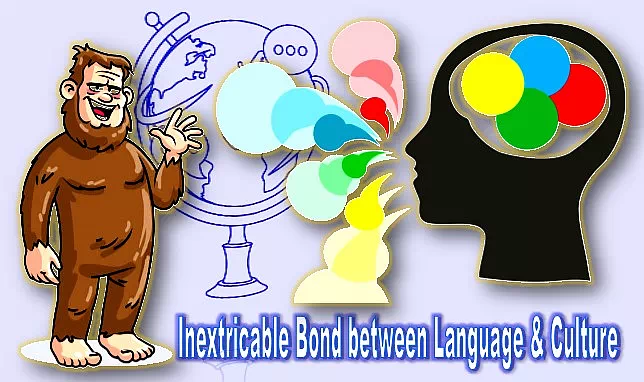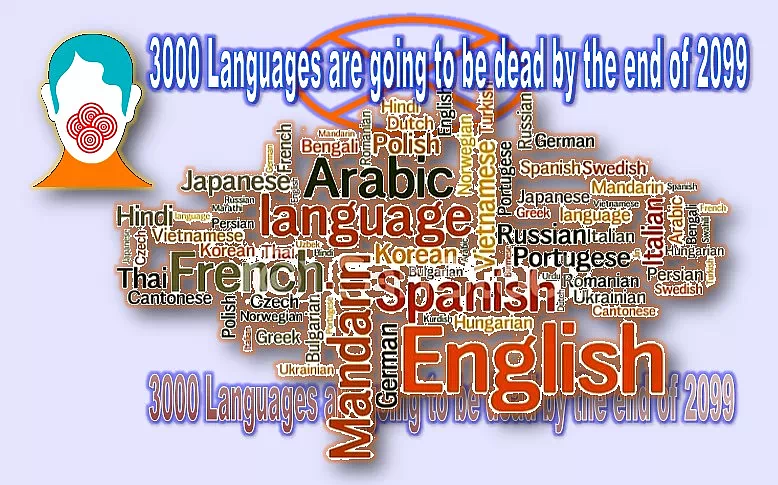About 3000 Languages are going to be dead by the end of 2099.
What is a language?
It is a system of conventional spoken or written symbols shared by people in a group or culture. Language is used to communicate with one another.
Amazon’s Educational Kits
How languages are differentiated?
Languages around the world are differentiated mostly according to their writing styles. Many languages in the world are related to one another like family tree branches.
- They are classified in many forms. Some popular forms are given below:
1. Phonetic Languages:
They are especially related to sounds of speech.
Example: English.
2. Ideographic Languages:
Importance is given to a character or symbol that stands for an idea or thing instead of a word or sound.
Example: Chinese.
3. Demotic (Colloquial) Languages:
These are the colloquial or common spoken form of languages as opposed to the literary form.
Example: A popular written or spoken form of Modern Greek.
4. Hieroglyphs:
Now it is a dead Language.
It was a sacred writing system used by ancient Egyptians.
Hieroglyphs are the written symbols. They are like pictographs and similar to pictures. This system is no longer in existence. The earliest use of hieroglyphs is estimated to be used in c. 8000 BCE. It was disappeared from Egypt by c. 500 CE. It was mostly used by ancient Egyptian priests.

According to usage all languages in the world can be grouped as:
1. Formal or Standard:
Mostly used in writings and formal or polite situations.
2. Creole:
It is a mother tongue formed from the contact of a European language such as African languages spoken by slaves in the West Indies.
3. Lingua Franca:
It is adopted as a common language between speakers of different languages.
4. Colloquial or Demotic:
These are the colloquial or common spoken form of languages as opposed to the literary form.
5. Pidgin:
A typical lingua franca but some elements are taken from a local language used esp. for trading.
6. Lingo/Jargon:
Special words used in a profession which are difficult for others to understand.
7. Slang:
Very informal language particularly used in speech and limited to certain colloquial contexts or group of people.
8. Vernacular:
The language form of a region or country spoken by ordinary people.
How many languages are there in the world now?
About 7,000 languages are now in existence.
When did languages evolve in human history?
It is very difficult to say when first languages were born. There was no trace or any fossil available to exactly estimate the time.
It is roughly assumed that language system first evolved about 100,000 years ago in early humans.
The writing system:
About 5,000 years ago the writing system was evolved.
How did intelligence in human brains develop much faster?
The usage of language expedite the human brains to develop faster. Languages occupied large portion of our brains and made us interconnect efficiently one another.

Inextricable Bond of Language & Culture:
Human cultures and Languages have a dense bond between them since primitive times. Separate cultures and separate languages were evolved with inextricable bond.
What languages are spoken mostly in the world?
Three lists are given based on the 2022 Ethnologue (Annual Publication of World’s Languages), comprising the top ten mostly spoken languages in the world.
The first list consists of the top 10 languages spoken as the First-Language.
The second list contains the top 10 languages spoken as the Second-Language.
The third list is made out of the top 10 languages spoken as of combining the First and Second Languages.
Top 10 spoken as “The First-Language”:
1. Mandarin Chinese: (excluding other varieties)
929 million people speak mandarin Chinese around the world.
2. Spanish:
474.7 million people speak Spanish around the world.
3. English:
372.9 million people speak English around the world.
4. Hindi: (excluding Urdu and other languages)
343.9 million people speak Hindi around the world.
5. Bengali:
233.7 million people speak Bengali around the world.
6. Portuguese:
232.4 million people speak Portuguese around the world.
7. Russian:
154 million people speak Russian around the world.
8. Japanese:
125.3 million people speak Japanese around the world.
9. Yue Chinese:
85.2 million people speak Yue Chinese. It is spoken in Southern China, mainly in Liangguang.
10. Vietnamese:
84.6 million people speak Vietnamese as the first language.
Top 10 spoken as “The Second-Language”:
1. English:
1.080 billion people speak English as the Second-Language around the world.
2. Modern Standard Arabic (excluding dialects):
274 million people speak Modern Standard Arabic as the Modern Standard Arabic.
3. Hindi: (excluding Urdu and other languages)
258.3 million people speak Hindi as the Second-Language around the world.
4. Mandarin Chinese: (excluding other varieties)
198.7 million people speak Mandarin Chinese as the Second-Language.
5. French:
194.2 million people speak French as the Second-Language around the world.
6. Urdu: (excluding Hindi)
161 million people speak Urdu as the Second-Language around the world.
7. Indonesian: (excluding Malay)
155.4 million people speak Indonesian as the Second-Language around the world.
8. Nigerian Pidgin: (an artificial trading language)
116 million people speak Nigerian Pidgin as the Second-Language around the world.
9. Russian:
104.1 million people speak Russian as the Second-Language.
10. Spanish:
73.6 million people speak Spanish as the second language.

Top 10 Languages spoken both as “The First & Second Languages” (combined list):
1. English:
1.452 billion people speak English around the world both as the first and the second language.
2. Mandarin Chinese (Standard Chinese) (excluding dialects):
1.118 billion people speak Mandarin Chinese.
3. Hindi: (excluding Urdu and other languages)
602.2 million people speak Hindi.
4. Spanish:
548.3 million people speak Spanish.
5. French:
274.1 million people speak French.
6. Modern Standard Arabic: (excluding dialects)
274 million people speak Modern Standard Arabic.
7. Bengali:
272.7 million people speak Bengali.
8. Russian:
258.2 million people speak Russian.
9. Portuguese:
257.7 million people speak Portuguese.
10. Urdu (excluding Hindi):
231.3 million people speak Urdu.
Anomalies found in the distribution of Languages among people:
As per statistics estimated in 2010, only 83 languages were used among 80% of people among the world.
The total languages in spoken form around the world by that time were estimated as about 7,000.
Less than 1% of world population speak more than 3000 languages out of the total languages i.e. about 7000.
There is a rapid rate of extinction observed that almost 3000 languages are going to die by the end of 2099.
First among them are:
Yuchi language in Oklahoma:
Only 5 people remained to speak their ancestral mother tongue of Yuchi Indian Language.
Tofa language in Siberia:
There are less than 25 people now speaking this language.
Halkomelem in Canada:
Only 200 speakers found using this language.
Urarina in the Amazon:
It is spoken by less than 3,000 people.

Why do languages die?
There prevailed many different reasons.
There is one common phenomena found in most of the dying languages.
They are being stopped using by their native speakers.
Most of the original speakers of many native languages are being attracted to globally dominant languages. The inevitable globalization tendency leave a fatal effect on many mother tongues.
What happens when a language dies?
A precious treasure of literature and culture in terms of knowledge, traditions, style of living, culture, poetry and myths are lost.
Fundamentally the long-gained knowledge of workings of the human brain is shadowed abruptly.




